Writing in the first weeks of the COVID-19 pandemic in North America, life as we've known it has come to a standstill. In all major cities and most states, offices and restaurants have closed, and layoffs are through the ceiling. Even with an unprecedented federal stimulus response on the way, no one can be certain what will happen in the next month or next quarter, let alone beyond.
The painful disruptions now visited upon people's lives and livelihoods are impossible to ignore, and as much as we remind ourselves that the social distancing and widespread shutdowns won't last, it also seems unlikely that life will return completely to the "normal" of before. To be sure, the ramifications of the present catastrophe will depend on how long the economic dislocation lasts, not to mention how devastating the illness itself proves to be. But one thing we know for sure: the ongoing pandemic will change American life and work culture in some ways we can already see and others yet to be revealed.
My firm, Beutler Ink, is relatively well-situated to weather the pandemic. We are a remote team, and have been since the company launched, so our daily routine remains unchanged. We're also a digital marketing agency, and thus our work continues mostly uninterrupted. We have, of course, had some new business and even current projects put on hold. But we count ourselves among the lucky.
So what might change once business life resumes? My recent conversations, reading, and thinking have focused on the corporate teams we interact with daily, the technology that makes our work possible, and the food and retail options we have come to take for granted. This scope feels narrow when I think about the breadth of industries and occupations that make up the wider economy. But for now, here's what I'm thinking about most:
The Vanishing: Simply put, many of the businesses now suspending operations will not return. Most vulnerable of all are low-to-midrange restaurants and coffee shops known for their razor thin operating margins, but also department stores, specialty shops and other types of retail which are already laying off workers to save themselves. Notwithstanding trillions of dollars in assistance, we're likely to enter at least a couple of years of higher unemployment, noticeably shuttered storefronts, and less visible bankruptcies as well. Retail store closures have been an alarming trend for several years already, with rents ever rising and more buyers choosing to shop online, and this will only accelerate the trend.
The Leftovers: Retail and restaurants will downsize, but that doesn't mean they'll go away entirely. Experiential stores and showcases for products you really want to lay hands on first may replace some of them, but even these outlets will likely be smaller than we're accustomed to. It's also not inconceivable that many stores will borrow a page from the restaurant industry and require reservations in order to allow shoppers their prescribed six feet of space. Downtown restaurants will suffer the most, and the lunchtime places may disappear entirely.
Those that remain will skew toward the higher end—meaning restaurants that can handle the costs of additional space and security. Restaurants and bars that survive the coming months may even choose to convert themselves to a membership model, where you'll still mingle with people from your neighborhood, but you'll theoretically have a better idea who is sitting nearby. Co-working spaces face similar challenges, as their economics are largely predicated on subdividing office space into smaller units than traditional offices. As if things weren't bleak enough for WeWork already.
The WFH Revolution: Millions of Americans use computers at work, and now many are doing so at home for the first time. It stands to reason that a majority of those now filing for unemployment benefits work in industries where this is not possible. For everyone else, this is an unprecedented opportunity to see what happens when the whole team works remote, and the odds are good that most businesses will become increasingly comfortable with the practice. According to the Census, about 5% of Americans worked from home in 2017. The current number as I write this is obviously much higher, but has yet to be counted. What happens if the medium-range outlook is a lot more like the present and less like the past?
Work hours will likely become more flexible in any industry that can allow for it, because workers will demand it. This may even extend into a reshaping of the work week: we might front-load certain tasks to the front half of the week vs. the back half, or work longer hours but only four days. (This is something Beutler Ink had started only just this year.) This all sounds nice—and long-stalled productivity growth may finally come unstuck—but the lack of a commute doesn't necessarily accrue to your free time: it probably means working longer hours. And without cleaning staff to tidy up overnight, it also probably means less free time, thanks to chores.
The WFH Risks: One of the advantages of having your employees come into the office is they can all use a shared network, reducing security costs, especially in the face of the ubiquitous threat of phishing attempts and related shakedowns. Some companies may turn to virtual private networks (VPNs) to encrypt data traveling across public networks, but today's VPNs are easily overloaded and most companies haven't made the necessary provisions. All in all, it means more internet traffic, and the big video streaming companies have already started to proactively degrade download speeds; broadband investment, always a political football, will become far more important to large businesses and policymakers. Internet scams, DDoS attacks and (software) viruses were already a problem, but soon the target could become even bigger.
Relocation and urban real estate: On the other hand, you may be working longer hours from a place you'd rather actually be. You might finally have the opportunity to move out of a city you had to live in for work and settle down in a city you and your spouse like better, one which may be more conducive to starting a family. The "winner-take-all urbanism" of New York, San Francisco, and Washington, DC may look like less of a problem in a few years' time. Simultaneously, if office leasing declines enough in coming years, some of that real estate may be repurposed as residential buildings. Rents have skyrocketed in urban centers over the past decade, but if square footage suddenly explodes, the major American city could be reshaped in ways we can only begin to imagine.
Lunch, coffee, or Zoom?: Without concentrations of workers in downtowns, say goodbye to casual lunches and coffees. Intentionality will go up, but the serendipity of a casual meeting with an industry colleague or business partner will become vanishingly rare. Video meetings and even virtual conferences will become far more common. Zoom has been the big winner in terms of mindshare so far, which means it will attract competition, but the company is already on the way to becoming a Verb. It's also not hard to envision Zoom as a powerful new advertising platform, at least at the free tier. And if we do all spend more time in virtual boardroom discussions and networking meetings, it's likely your home office will start to change, too. Do you really want to hold all these meetings on your current monitor setup? It's easy to imagine a new norm where white collar workers install a larger, dedicated screen in their workspace, and perhaps create more professional-looking home offices to handle all these meetings.
The end of SXSW as we know it: Large annual meetings have already come under pressure from environmentalists in recent years due to the mass quantities of airline fuel, plastic and dead tree products consumed in their staging. Now there is an even better reason to rethink them: they are an extremely efficient way to spread infections. SXSW will probably survive, even if downsized, but lesser known conferences will fold. What will they do instead? This may actually be a business opportunity for Zoom or one of its competitors: people are already using the video conference software to create virtual audiences for live concerts, stand-up comedy, and other events. Instead of an annual conference—or as a supplement to a smaller one—trade shows and annual meetings could create a subscription whereby they bring together their members a few times a year for targeted events. This is bad news for hotels, airlines, public transport, and car rentals, too.
A new era for VR: Oftentimes a potentially revolutionary new product or platform fails to gain traction not because of technology issues per se, but for business reasons: it's too expensive to adopt, not enough others have adopted it, or the need isn't quite there yet. Virtual reality (VR) has been in this position for a long time. It's been more than half a decade since Facebook bought Oculus. How many people do you know who own an Oculus? Major upheavals can move markets in ways that might still have happened over a much longer period of time. (See: working from home.) But they can very occasionally make non-viable industries suddenly viable. If the coronavirus continues to recur and destabilize the market for live music events, theatrical productions, movie theaters, or even university classrooms, VR could suddenly look a lot more attractive. Health precautions may be the killer app it never had before.
Silicon Valley becomes systemically important: The pandemic looks like great news for the technology giants of today—Amazon, Google, Facebook, Microsoft, and Apple chief among them—at least up to a point. When fewer people are leaving home, information services and social connection through the internet becomes more important than ever. Their precipitous rise has already attracted government scrutiny: the EU has passed several rounds of regulations, and even in the more hands-off American regulatory state, the tech giants (Facebook in particular) have very recently passed through the Senate's antitrust crosshairs. Financial institutions are deemed "systemically important" when they get large enough that their failure would undermine the economic system. Each of the firms named above also dominate at least one market that underpins the workings of modern life. None of them are anywhere close to failure, of course, but they have reshaped so much economic activity in the last decade that in many ways they are the system.
An ever hollower middle: This is a familiar refrain, and for good reason: the shrinking middle class has been a theme of economic research for a generation, and inequality has grown along with it. Technology has played a significant role in this, whether it's a direct-to-consumer startup "cutting out the middleman" to deliver a product formerly bought at brick-and-mortar retail establishments, or a legacy business finding ways to replace workers with automated processes. But now there's another reason to hire robots instead of humans: it's no longer just for the benefit of the bottom line, it's for the humans' own (collective) good. Noting again that the difference between having a job today and not having one is likely correlated with that job requiring a computer, here too technology will play an unexpected role in separating the haves and have nots. The universal basic income advocated by Andrew Yang did not find much purchase in the Democratic presidential primary, but in 2020 and ahead, the idea will get another look.
Being essential: As offices clear out, only essential on-site activities will take place in an office or retail setting. In fact, the concept of "essential" may come to loom larger in corporate decision-making than ever before. What is the value conferred by putting hands on an object? What really has to happen in person? Especially over the next several quarters: what really has to happen at all? And what do we value differently than we did just a few weeks ago? This goes for goods, but it also goes for people: it turns out that anyone who comes into proximity with you or your loved ones to provide a key service is also someone who can get you sick, whether it's doctors, grocery clerks, food preparers, or child care workers. Most employees in these categories are low-paid now, and a burger flipper will never be compensated like an ophthalmologist. But even at a time of increasing gratitude for those working on these newly drawn front lines, and amid calls to pay them more, these jobs too may split between higher and lower end paths.
This is but a brief summary of transformations that may or may not come to define American business, to say nothing of everyday life, for years to come. My experience is that of a small agency executive working with corporate clients large and small, and someone with much different experiences will assuredly have their own insights.
Undoubtedly, changes both positive and negative will occur in manufacturing, delivery and logistics, sports and entertainment, publishing, energy, financial services, and not least travel. Many will follow the patterns described above, and others will have their own unforeseen shifts. Likewise, most of the changes discussed here are focused on the domestic economy, but indeed it was the global economy that made the spread of coronavirus inevitable, and which has been laid low in a way we've never seen.
It would be foolish to predict too much of the future in too much detail. But even in these early weeks, it's reasonable to guess that in the future, we will directly interact with fewer people on a day to day basis. But we might also find we can get much more done by working from afar.
William Beutler is a writer and entrepreneur based in Washington, DC. He is the CEO of Beutler Ink, a digital marketing agency that has worked remote since 2013."















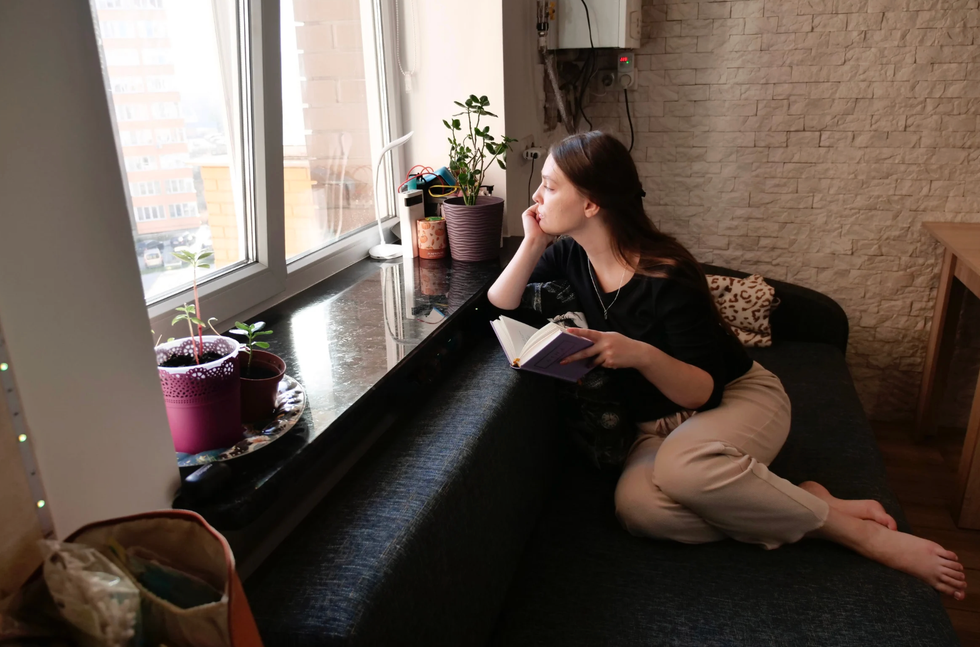 A woman relaxes with a book at homeCanva
A woman relaxes with a book at homeCanva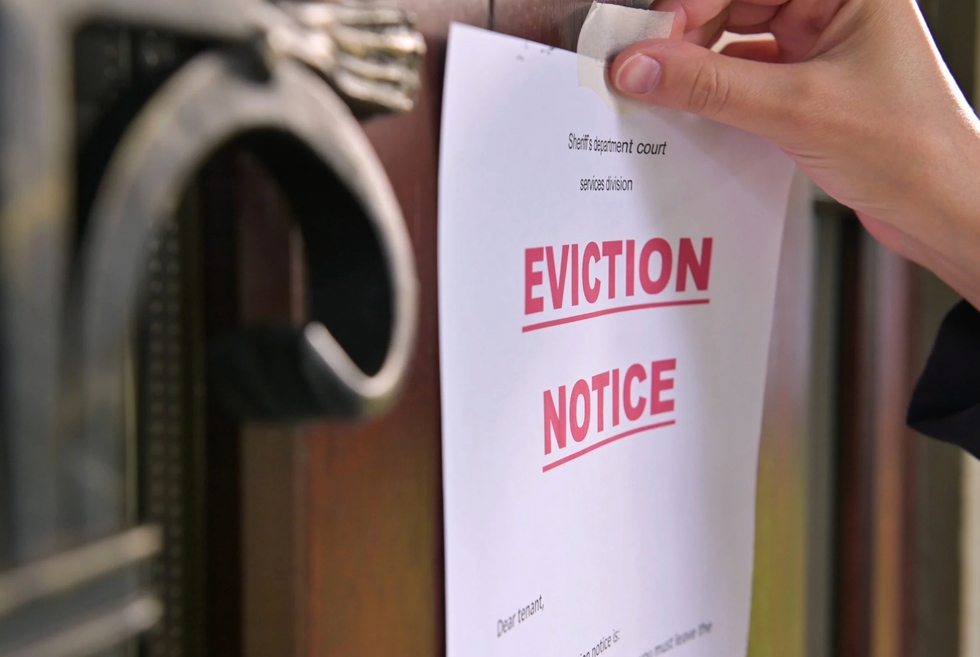 An eviction notice is being attached to a doorCanva
An eviction notice is being attached to a doorCanva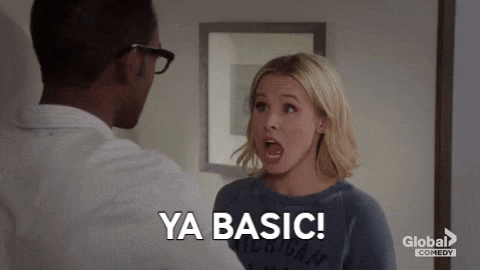 Gif of Kristen Bell saying 'Ya basic!' via
Gif of Kristen Bell saying 'Ya basic!' via 
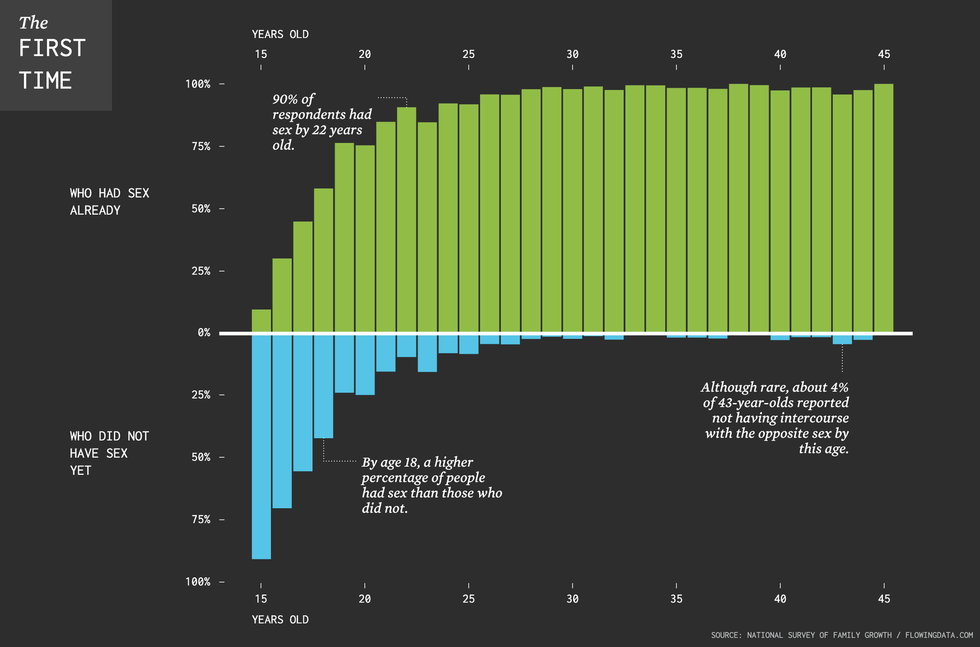 The chart illustrates that between ages 16 and 20, roughly half the population loses their virginity. By age 22, 90% of the population has had sex.
The chart illustrates that between ages 16 and 20, roughly half the population loses their virginity. By age 22, 90% of the population has had sex.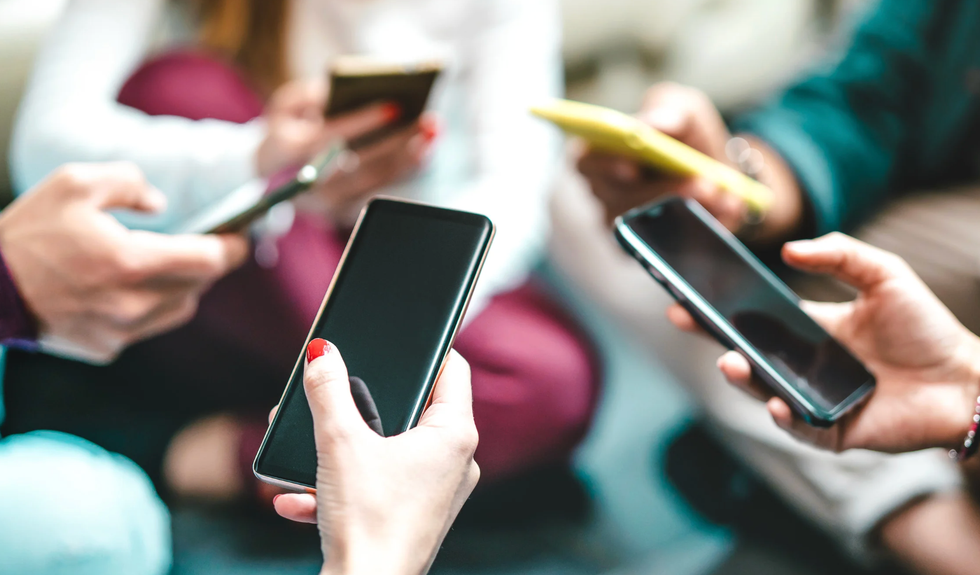 A group of young people hold their phonesCanva
A group of young people hold their phonesCanva
 (LEFT) Judy Garland as Dorothy Gale and (RIGHT) Ray Bolger as Scarecrow from "The Wizard of OZ"CBS/
(LEFT) Judy Garland as Dorothy Gale and (RIGHT) Ray Bolger as Scarecrow from "The Wizard of OZ"CBS/  (LEFT) The Wonderful Wizard of Oz children's novel and (RIGHT) The Wizard of Oz movie poster.William Wallace Denslow/
(LEFT) The Wonderful Wizard of Oz children's novel and (RIGHT) The Wizard of Oz movie poster.William Wallace Denslow/ 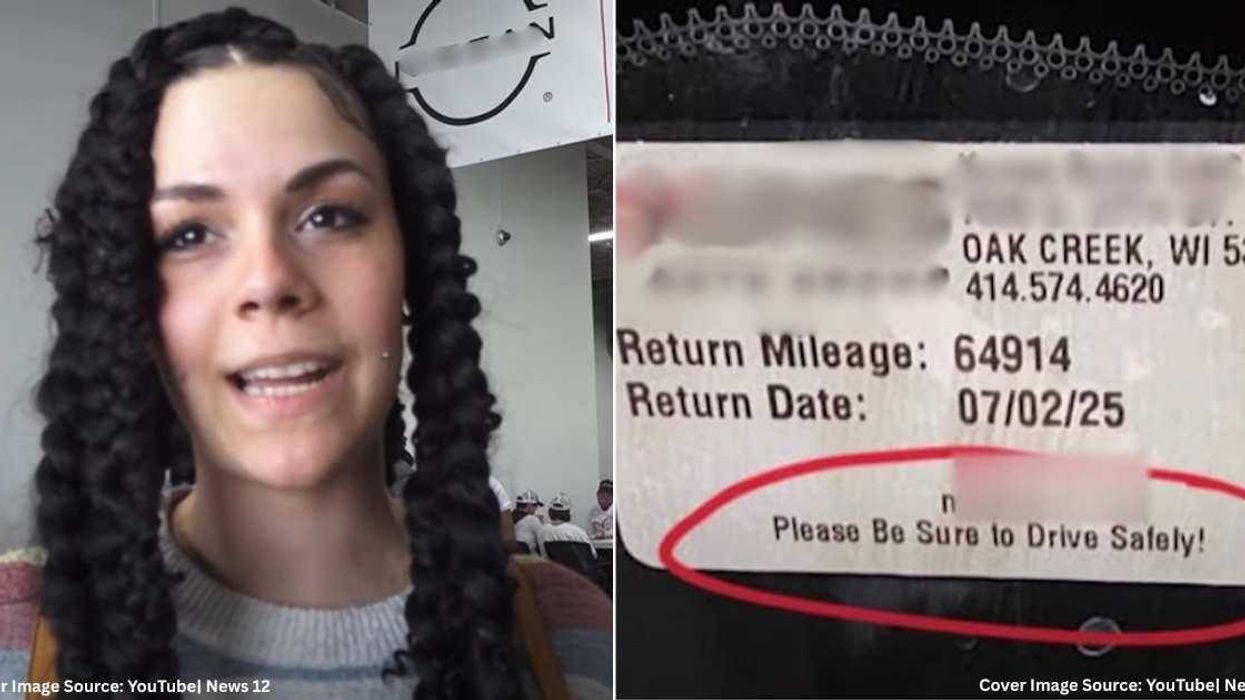
 A frustrated woman at a car dealershipCanva
A frustrated woman at a car dealershipCanva Bee Arthur gif asking "What do you want from me?" via
Bee Arthur gif asking "What do you want from me?" via 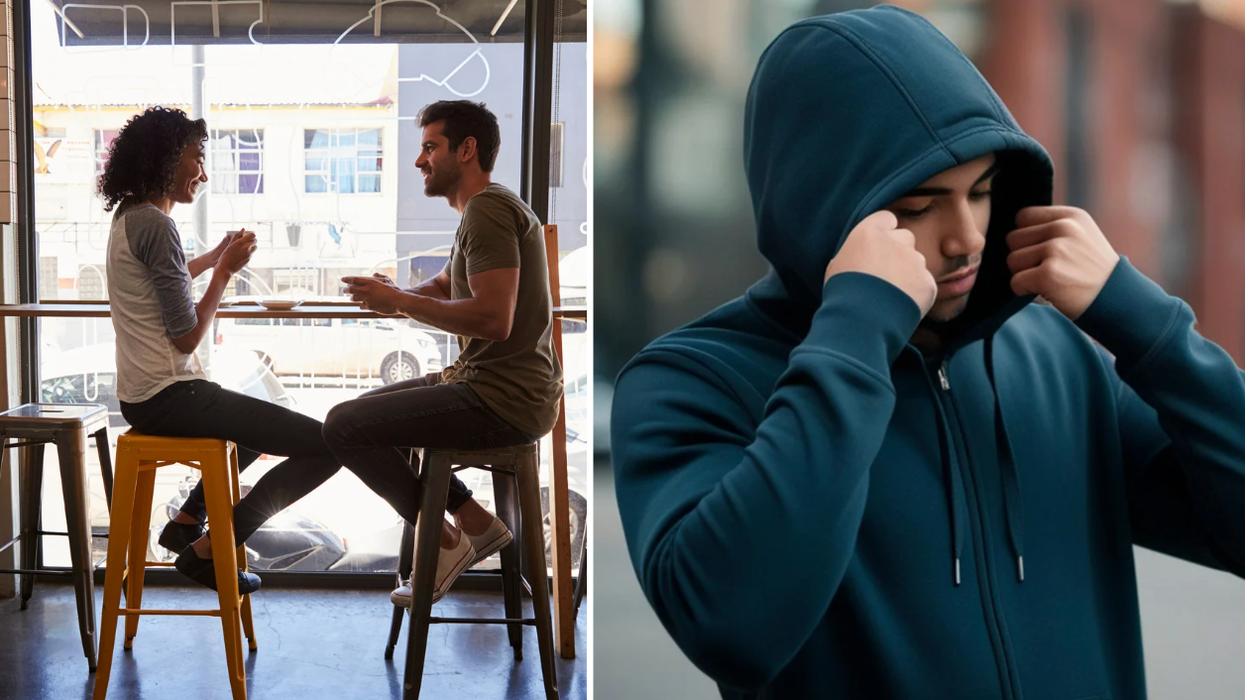
 A couple on a lunch dateCanva
A couple on a lunch dateCanva Gif of Obama saying "Man, that's shady" via
Gif of Obama saying "Man, that's shady" via 
 Elegance in red.Photo credit:
Elegance in red.Photo credit:  An older woman shows off some bling.Photo credit:
An older woman shows off some bling.Photo credit:  A woman enjoys a beautiful day. Photo credit:
A woman enjoys a beautiful day. Photo credit: 